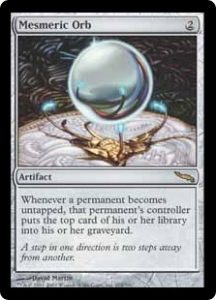This weekend marked the last Modern PPTQ of the season (there is one more PPTQ on October 8th, but it’s Kaladesh Sealed!), and with it, a very interesting choice. I’ve long been a champion of Grishoalbrand in Modern-I’ve studied the various iterations, and tuned the deck to be the best version it can be for my playstyle, but over the last few weeks the deck seemed to be losing its lustre. And with the rise of Dredge and other graveyard synergies, Grim Flayer seeing play in Jund for example, also came the rise of graveyard hate in many sideboards, and this was bad news for my little reanimator combo. So this weekend I was presented with an interesting choice: do I continue to play the deck I know inside and out, or do I play a deck that I’d consider one of the best positioned decks in the format?
I’ve increasingly recognized the importance of understanding the metagame you are playing in, but Modern is a peculiar beast in that it rewards you knowing your own deck more than any other format. It is largely uninteractive, and with very powerful, sometimes very complex combos and synergies. So if you can master your particular deck, be it Affinity or Eldrazi, you are going to see success. Alberta however, and particularly Edmonton, has a fair amount of BGx and control decks: Jund, Junk, Jeskai and Grixis. In fact, of the 32 decks played on Saturday, only 6 or 7 would be considered ‘aggro’.
It was with our metagame in mind that I recognized the success of Oliver Tiu in the Modern portion of the World Championship. In a field filled with Junk, Jund, and Bant Eldrazi decks, Oliver’s TitanShift deck was uniquely positioned to smash face. And that’s exactly what it did, going undefeated throughout the Modern rounds. Recognizing the similarities between that field and my own, I called up the local Valakut, The Molten Pinnacle master to see if he had a spare copy to lend. In my brief introduction to the cards, I quickly realized that the deck was strong enough to carry me through my inexperienced misplays.
I was able to take the Valakut-Through the Breach-Primeval Titan monstrosity to the Top 8 of Saturday’s event, losing in the quarterfinals to Dredge, and was supremely happy with my deck choice all day. Against decks like Jeskai and Bant Eldrazi, the clock you are able to create in the late game where every land is a lightning bolt (or two), usually represents inevitability that your opponents have no answer for. I would love to get in more reps with the deck, and think it will continue to be well-positioned in the future. I’m sad to see Modern go, as I feel like I’ve just scratched the surface of understanding this vast and complex format
If we look through the history of metagames, we’ll see similar situations play out in a variety of formats. The printing of Liliana, The Last Hope in Eldritch Moon meant that both UW Spirits and Mono-White humans, two decks chalk-full of X-1s, became incredibly poorly positioned. At the M15 Pro Tour, Ivan Floch won with Azorious Control and the deck became prevalent. Tom Ross was then able to take advantage of the slowed-down format with a mono-red deck featuring all-star Goblin Rabblemaster. As well, in “Eldrazi Winter”, Affinity was the only other deck to make it to the Top 8 of the Pro Tour. While that’s an extreme example, as Eldrazi was able to push most other decks out of the format, I think it underscores the point well (though in that case, your best bet might’ve been to just to play Eldrazi).
While I recognize the importance of knowing a deck inside and out, being able to read your local metagame and adjust your deck choice accordingly is equally important. When you’re making your own constructed choices, whether for Modern, Standard, Legacy or Pauper, taking the time to read the scene and understand which decks are the proverbial ‘scissors’ to the fields ‘paper’ is just as significant as knowing how to play the deck you choose.
About the author: Chantelle Campbell hasn’t done anything notable within Magic: The Gathering, but makes up for it with passion and dedication to the game. Outside of MTG, her notable accomplishments include the ability to say the alphabet backwards and memorizing all of the lyrics to Blackalicious’ Alphabet Aerobics.


